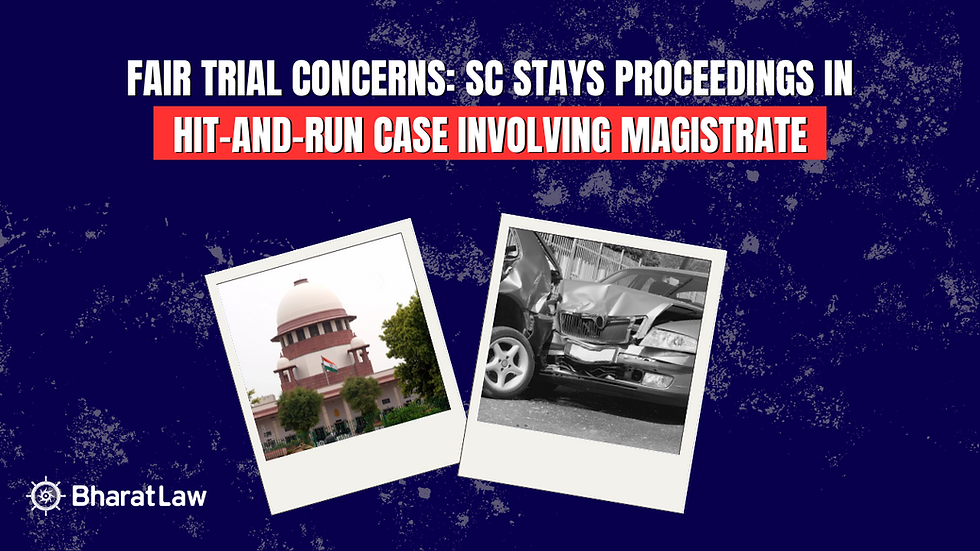Punishment Must Not Be Disproportionately Excessive – Supreme Court's Landmark Ruling on Legislative Expulsions
- Chintan Shah

- Feb 26, 2025
- 4 min read
Summary of the Judgment
Case Name: Dr. Sunil Kumar Singh v. Bihar Legislative Council
Case Number: Writ Petition (Civil) No. 530 of 2024
Court: Supreme Court of India
Date of Judgment: 25 February 2025
Bench: Hon'ble Justice Surya Kant and Hon'ble Justice Nongmeikapam Kotiswar Singh
Advocates:
For the Petitioner: Dr. Abhishek Manu Singhvi and Mr. Gopal Sankarnarayanan, Senior Advocates
For the Respondents: Mr. Ranjit Kumar, Senior Advocate
Relevant Acts and Sections:
Article 32 of the Constitution of India (Writ Jurisdiction)
Article 212(1) of the Constitution of India (Legislative Privilege)
Section 151A of the Representation of People Act, 1951
Cited Judgments:
Ashish Shelar v. Maharashtra Legislative Assembly, (2022) 12 SCC 273
Raja Ram Pal v. Hon’ble Speaker, Lok Sabha, (2007) 3 SCC 184
Ranjit Thakur v. Union of India, (1987) 4 SCC 611
Maneka Gandhi v. Union of India, (1978) 1 SCC 248
Internet & Mobile Association of India v. RBI, (2020) 10 SCC 274
Introduction
The Supreme Court of India in Dr. Sunil Kumar Singh v. Bihar Legislative Council addressed crucial questions on the scope of judicial review over legislative disciplinary actions. The case arose from the expulsion of Dr. Sunil Kumar Singh, a member of the Bihar Legislative Council (BLC), following allegations of disruptive behavior in the House. The judgment clarifies the principles of natural justice, proportionality, and judicial intervention in legislative matters.
Background of the Case
The petitioner, Dr. Sunil Kumar Singh, was expelled from the Bihar Legislative Council based on recommendations from the Ethics Committee. His conduct during a parliamentary session, where he allegedly used unparliamentary language and engaged in disruptive behavior, led to proceedings against him. The Ethics Committee found his actions objectionable and recommended his expulsion, a decision subsequently ratified by a majority of the House.
Challenging the decision, the petitioner invoked Article 32 of the Constitution, arguing that the expulsion was disproportionate, violated the principles of natural justice, and was politically motivated.
Key Legal Issues
1. Maintainability of the Writ Petition Under Article 32
The respondents contended that Article 212(1) bars judicial review of legislative proceedings. The Court, however, rejected this argument, distinguishing between procedural irregularities (which are immune from judicial scrutiny) and substantive violations of constitutional rights (which remain justiciable). The Court ruled:
"Article 212(1) does not operate as an absolute bar to judicial review, particularly when the action impugned has direct implications on fundamental rights."
2. Scope of Judicial Review Over Legislative Actions
While legislative bodies enjoy privileges and autonomy, their actions must adhere to constitutional principles. The Court reaffirmed its authority to review decisions tainted by mala fides, arbitrariness, or violations of fundamental rights.
"Judicial review serves as a constitutional safeguard against legislative actions that undermine democratic principles and fundamental rights."
3. Proportionality of Punishment
The Court extensively analyzed the doctrine of proportionality, which requires that penalties imposed be commensurate with the gravity of the misconduct. It observed that lesser penalties (e.g., suspension or censure) were available under the Rules of Procedure of the BLC, yet the petitioner was awarded the harshest punishment.
Citing Ranjit Thakur v. Union of India, the Court held:
"Punishment must not be disproportionately excessive; it should align with the nature and severity of the offence."
4. Judicial Power to Modify Punishment
The respondents argued that even if the punishment was excessive, the Court should not interfere in the quantum of punishment. However, invoking Article 142 of the Constitution, the Court ruled that it could exercise extraordinary powers to grant complete justice. It reasoned that sending the matter back to the House for reconsideration would cause unnecessary delay and prolong the petitioner’s exclusion from legislative proceedings.
Judgment and Rationale
The Supreme Court set aside the expulsion, ruling that the period of expulsion already undergone by the petitioner would be deemed as a suspension. It directed the immediate reinstatement of the petitioner but denied back pay and other financial benefits for the period of expulsion.
Guidelines for Future Legislative Disciplinary Actions
The Court provided a structured framework for assessing the proportionality of punishments imposed by legislative bodies. It outlined key factors to consider, including:
The nature and severity of the misconduct
Whether the member’s actions disrupted legislative proceedings
Whether alternative, less restrictive measures were available
Whether the punishment serves disciplinary rather than retributive purposes
Implications of the Judgment
Strengthened Judicial Oversight – The ruling reaffirms that legislative privileges are not absolute and remain subject to constitutional principles.
Affirmation of Proportionality – The Court reinforced the principle that punishments must be commensurate with the offence.
Enhanced Protection of Democratic Participation – The judgment prevents arbitrary expulsion of elected representatives, ensuring that constituents are not deprived of representation unfairly.
Conclusion
The Supreme Court’s judgment in Dr. Sunil Kumar Singh v. Bihar Legislative Council is a landmark decision that reinforces the balance between legislative autonomy and constitutional oversight. By ensuring that disciplinary actions are proportionate, non-arbitrary, and in compliance with fundamental rights, the Court has strengthened democratic accountability and the rule of law in India’s parliamentary system.



Comments